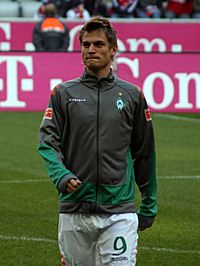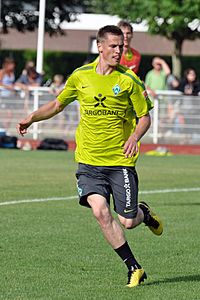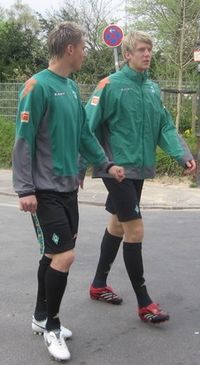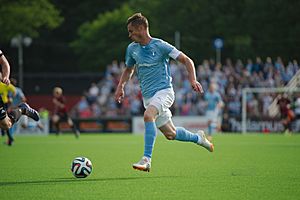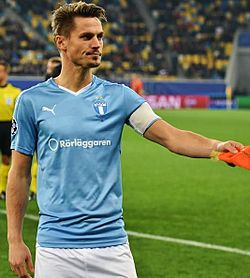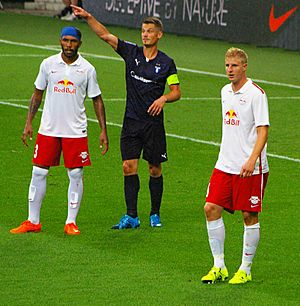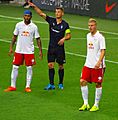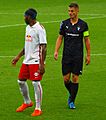Markus Rosenberg facts for kids
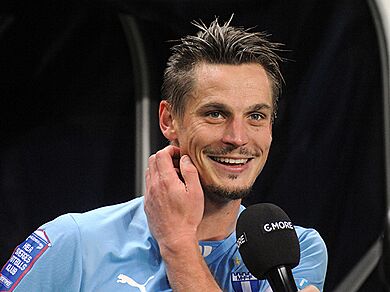
Rosenberg during his second spell at Malmö FF in 2014
|
|||
| Personal information | |||
|---|---|---|---|
| Full name | Nils Markus Rosenberg | ||
| Date of birth | 27 September 1982 | ||
| Place of birth | Malmö, Sweden | ||
| Height | 1.84 m (6 ft 0 in) | ||
| Position(s) | Forward | ||
| Youth career | |||
| 1987–2001 | Malmö FF | ||
| Senior career* | |||
| Years | Team | Apps | (Gls) |
| 2001–2005 | Malmö FF | 52 | (8) |
| 2004 | → Halmstads BK (loan) | 26 | (14) |
| 2005–2007 | Ajax | 40 | (12) |
| 2007–2012 | Werder Bremen | 123 | (40) |
| 2007 | → Werder Bremen II | 2 | (0) |
| 2010–2011 | → Racing Santander (loan) | 33 | (9) |
| 2012–2014 | West Bromwich Albion | 28 | (0) |
| 2014–2019 | Malmö FF | 156 | (67) |
| Total | 460 | (150) | |
| International career | |||
| 2002–2004 | Sweden U21 | 9 | (3) |
| 2005–2012 | Sweden | 33 | (6) |
| *Club domestic league appearances and goals | |||
Nils Markus Rosenberg (born on September 27, 1982) is a Swedish former professional footballer. He played as a forward, which means he was a goal scorer. Markus spent most of his career with his childhood club, Malmö FF. He also played for five years with the German team Werder Bremen.
Markus Rosenberg was the captain of Malmö FF from 2015 to 2019. He played 33 games for the Swedish national team and scored 6 goals. He also represented Sweden in big tournaments like the 2006 FIFA World Cup, UEFA Euro 2008, and UEFA Euro 2012.
Rosenberg started his career at Malmö FF. He became the top scorer in the Swedish league, Allsvenskan, while on loan at Halmstads BK in 2004. His success in Sweden led him to play for clubs across Europe. These included Werder Bremen in Germany, Ajax in the Netherlands, Racing de Santander in Spain, and West Bromwich in England.
When he returned to Malmö FF in 2014, Rosenberg scored many important goals. He helped the team reach the UEFA Champions League group stage and win the league title. He continued to help Malmö FF qualify for the Champions League group stage in 2015. He also won two more league titles with Malmö in 2016 and 2017. His second time at Malmö FF was very successful. Many people consider him the club's greatest player of the 21st century.
Contents
Playing for Clubs
Starting at Malmö FF
Markus Rosenberg started playing football at Malmö FF when he was just five years old. He was very good in the youth teams. He began as a right-back but changed to a striker when he was 16. In 2000, he scored 26 goals for the club's reserve team. This helped him get promoted to the main team. During his time in the youth system, he was nicknamed "Sillen," which means "The Herring," because he was small and quick.
Early Years: 2001–2003
Rosenberg played his first league game on May 10, 2001, against AIK. He came into the game as a substitute. On July 2, 2001, he scored his first goal for Malmö FF. However, it was hard for him to become a regular starter. There were other strong players like Niklas Skoog and Peter Ijeh. He also had some injuries. Despite this, he signed a three-year contract. In 2001, he played 15 games and scored one goal.
In 2002, Rosenberg still found it hard to get playing time because of competition and injuries. He often played for the reserve team. By the end of the season, he started more games. He finished 2002 with 13 appearances.
Rosenberg started the 2003 season well, scoring in the first match. On May 29, 2003, he scored two goals in a cup game against IFK Luleå. He made his first European game appearance in a UEFA Cup match. By the end of 2003, Rosenberg played 21 games and scored five goals. He then signed another three-year contract.
Loan to Halmstads BK
In 2004, Malmö FF bought two new strikers. So, Rosenberg decided to go on loan to Halmstads BK. He quickly made a big impact. He scored in his first game for Halmstads. He became a regular starter as a striker.
On September 14, 2004, he scored two goals against his parent club, Malmö FF. He also scored a hat-trick against Örebro. Rosenberg became the top goal scorer in the Allsvenskan league in 2004. Halmstads BK finished second in the league, just behind Malmö. He played 29 games and scored 17 goals that season.
Returning to Malmö and Moving On: 2005
After his loan, Rosenberg came back to Malmö FF for the 2005 season. He started in the first game. He scored his first goal of the season in a 1–0 win against Landskrona BoIS. He kept his starting spot and played well with another striker, Afonso Alves. Before leaving Malmö, he was also the top scorer in the Royal League 2004–05 and had the most assists in the Allsvenskan. He then joined the Dutch club Ajax. He played 13 games and scored 5 goals before he left.
Playing for Ajax
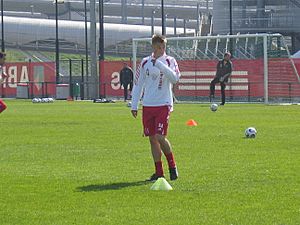
Rosenberg joined Eredivisie team Ajax in 2005. He moved for about €5.3 million. He had turned down a big offer from a Russian club. He said that money wasn't everything and he wanted to play in the right country and league.
First Season at Ajax: 2005–06
The manager, Danny Blind, immediately put Rosenberg in the starting team. He scored in his very first game for Ajax in a UEFA Champions League qualifying match. He also scored in his first Eredivisie league game. In September 2005, on his 23rd birthday, he scored against Arsenal in the Champions League.
Later in the season, Ajax changed their playing style. Rosenberg scored five goals in a row in early 2006. He also scored twice in a 6–0 win against RBC Roosendaal. Ajax improved their performance and reached the Eredivisie play-offs. They won these play-offs to get a spot in the Champions League for the next season. Ajax also won the KNVB Cup that year. Rosenberg played 48 games and scored 15 goals in his first season.
Second Season and Leaving Ajax: 2006–07
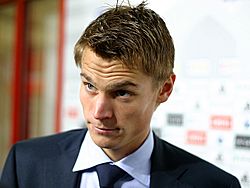
At the start of the 2006–07 season, Ajax won the Johan Cruyff Shield. However, Rosenberg was no longer a regular starter. He was mostly a backup for another striker, Klaas-Jan Huntelaar. He scored three goals in two UEFA Cup games. By the time he left Ajax, he had played 14 games and scored three goals that season.
Time at Werder Bremen
On January 26, 2007, Rosenberg moved to the German Bundesliga club Werder Bremen. He signed a four-year contract. He was given the number nine shirt.
Spring Season 2007
Rosenberg played his first game for Werder Bremen two days after signing. On March 11, 2007, he scored his first goal for the club against Bayern Munich. He scored his first hat-trick for the club in a 4–1 win over Hertha BSC in May 2007. In the last game of the season, he scored twice. By the end of the 2006–07 season, Rosenberg had scored eight goals in 14 games. He was known as a very effective substitute player.
Great Season: 2007–08
At the start of the 2007–08 season, Rosenberg's goal scoring slowed down a bit. But he still played regularly for Werder Bremen. In November 2007, he scored a goal and set up another in a big 3–2 win against Real Madrid in the UEFA Champions League. He scored three goals in two matches in December. Later in the season, he scored five more goals. His goals helped Werder Bremen qualify for the Champions League again. In the 2007–08 season, Rosenberg played 42 games and scored 16 goals. He was Bremen's top league scorer with 14 goals.
Busy Season: 2008–09
Rosenberg started the 2008–09 season very well. He scored four goals in a cup game in August 2008. A week later, he scored two goals in a league game. In September, he scored twice in a 5–2 win over Bayern Munich. This was the first time Bremen beat Bayern at their home stadium. He continued to play regularly even with new players joining.
In March 2009, Rosenberg scored two goals in a 4–0 win. This ended a ten-game period without a goal. He played in the 2009 UEFA Cup Final but his team lost. However, Werder Bremen won the DFB-Pokal (German Cup) that year. By the end of the 2008–09 season, he played 47 games and scored 13 goals.
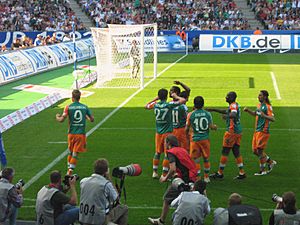
Challenges: 2009–10
Before the 2009–10 season, Rosenberg had a knee injury that kept him out for three months. When he returned, he often sat on the substitutes' bench because of strong competition. He scored his only league goal of the season in November 2009. He also scored three goals in the UEFA Europa League. He was frustrated about not playing much and thought about leaving the club. He played 24 games and scored four goals that season.
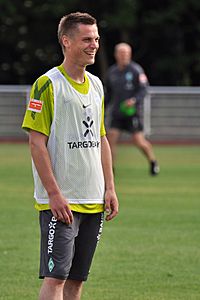
Last Season and Loan: 2010–11
Before the 2010–11 season, Rosenberg said he wanted to stay with Bremen. In a Champions League play-off game in August 2010, he scored a crucial goal in injury time. This helped Bremen reach extra time and eventually qualify for the Champions League group stage. This was his only game for Bremen that season. He signed a one-year contract extension.
Loan to Racing Santander
On the same day he extended his contract, Rosenberg was loaned to the Spanish club Racing Santander for the 2010–11 season. He said it was a dream to play in Spain.
He played his first game for Santander in September 2010. He quickly became a regular starter. He scored his first goal for Santander against Real Madrid. He then scored two goals in his next game. He finished the season as the club's top scorer with nine goals in 35 games. He said he wanted to keep playing in Europe before finishing his career at Malmö FF.
Final Season at Bremen: 2011–12
Rosenberg returned to Werder Bremen for the 2011–12 season. He started the season well, scoring in a cup game. He then scored two goals in the first league game of the season. He played regularly as a striker. He scored two goals in December 2011. He finished the 2011–12 season with 34 games played and 11 goals scored.
In May 2012, Werder Bremen decided not to extend his contract. Rosenberg was known for his strong headers and good ball control. Fans liked him and called him "Rosi."
Time at West Bromwich Albion
On August 7, 2012, the English Premier League club West Bromwich Albion signed Rosenberg on a three-year contract. He wore the number 8 shirt.
First Season: 2012–13
Rosenberg played his first game for West Bromwich Albion in August 2012. He came on as a substitute. He made his first start a few days later in a cup win. However, he found it hard to get regular playing time because of strong competition. He mostly came on as a substitute. He did assist two goals during the season. By the end of the 2012–13 season, Rosenberg played 24 league games but did not score any goals.
Second Season and Leaving: 2013–14
Rosenberg stayed at West Bromwich Albion for the 2013–14 season, even though he was told he could leave. He played his first game of the season in August 2013. But he still had limited chances to play. In October 2013, he said he wanted to leave the club. In February 2014, Rosenberg and the club agreed to end his contract. When he left, he donated everything in his house to charity.
Coming Back to Malmö FF
On February 1, 2014, Malmö FF announced that Markus Rosenberg was returning to the club after nine years. He signed a three-year contract.
Successful Return: 2014 Season
Rosenberg played his first game back for Malmö FF in a cup match. He scored and assisted a goal in his second game back. On April 7, 2014, he scored his first league goal since returning. He became the team captain in July 2014 after the original captain got injured.
Rosenberg went on a scoring streak from July to August 2014. He scored against several teams, including two goals against Sparta Prague. He also announced his retirement from the Swedish national team to focus on Malmö FF. The next day, he scored two goals as Malmö FF beat Red Bull Salzburg 3–0 to qualify for the 2014–15 UEFA Champions League. He scored again in the Champions League group stage, helping Malmö get their first win.
Overall, Rosenberg scored 15 goals and made 14 assists in the league in 2014. He was a very important player as Malmö FF won the league title. This was his first league title win. With 24 goals in all competitions, 2014 was his most successful season for goals. He was named Allsvenskan Forward of the Year and Allsvenskan Most Valuable Player of the Year.
Continuing Success: 2015 Season
Before the 2015 season, Rosenberg was named the new captain for Malmö FF. He started the season well, scoring two goals in cup games. He signed a contract extension, staying with the team until 2017. He continued to be a key player and captain.
Between July and August, Rosenberg scored eight goals. One important goal came in a 3–0 win over Red Bull Salzburg in the Champions League qualifying round. This win helped Malmö eliminate Salzburg for the second year in a row. In August 2015, Rosenberg scored the first goal as Malmö beat Celtic 2–0. This meant they qualified for the Champions League group stage for the second year in a row. He scored four more goals later in the season. Malmö FF finished fifth in the league in 2015. Rosenberg played 42 games and scored 16 goals that season.
Another League Title: 2016 Season
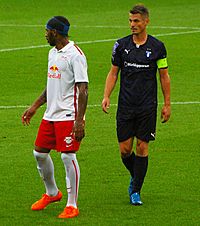
Rosenberg remained captain and a key player for the 2016 season. He scored his first goals of the season in a cup semi-final. He scored in a league game against Elfsborg. He was sent off in a game in May for a foul. While suspended from league games, he played in the Svenska Cupen Final and scored the first goal. However, Malmö FF lost the final in a penalty shootout.
After his suspension, he returned and scored in two more matches. In September 2016, he scored twice in a 3–1 win. He got injured in a game later that month. Even with Rosenberg sidelined, Malmö FF won their second league title with him in October 2016. He returned from injury in the last game of the season. By the end of 2016, Rosenberg played 28 games and scored 11 goals.
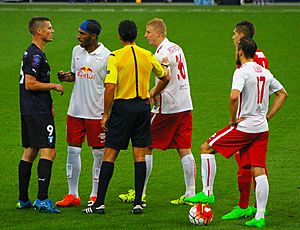
Third League Title: 2017 Season
Rosenberg continued as captain and a regular starter in the 2017 season. He scored his first goal of the season in April 2017. He scored three more goals in May. He suffered an injury in July and was out for three weeks. When he returned, he scored in a Champions League game, but Malmö was eliminated.
In August 2017, he received a red card for a foul. After his suspension, he scored his sixth goal of the season. He signed another one-year contract extension. He scored in two more matches. He helped Malmö FF win the league title again, their third with him. Rosenberg finished the 2017 season with 25 games played and 8 goals scored.
Another Strong Year: 2018 Season
Rosenberg kept his captaincy and starting spot for the 2018 season. He scored his first goal of the season in a cup game. In March 2018, he reached 101 goals for Malmö FF. He scored three more goals in April, including two in one game. He captained the team in the Svenska Cupen Final, but they lost.
His goal scoring continued in July, with five goals. He helped Malmö FF reach the 2018–19 UEFA Europa League group stage by scoring in both games against FC Midtjylland. He scored four more goals in the next two months. He finished the 2018 season with 46 games played and 19 goals scored. He signed another one-year contract extension in November 2018.
Final Season and Retirement: 2019
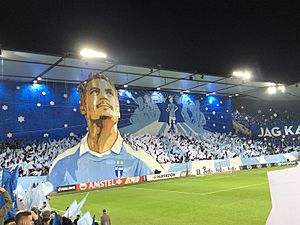
Rosenberg remained captain and a key player for his final season in 2019. He scored his first goal of the season in April. He scored two goals in a game a week later. He then scored two goals in two consecutive matches in May. On June 30, 2019, Rosenberg announced he would retire from professional football at the end of the season.
He scored a hat-trick in a UEFA Europa League game in July. He helped Malmö FF reach the 2019–20 UEFA Europa League group stages again. He scored two goals in a league game in September. In the last league game of the season, he scored twice. Malmö FF finished second in the league.
In his very last home game for Malmö FF, Rosenberg scored two goals in a 4–3 Europa League win against Dynamo Kyiv. He scored the winning goal in the last minute of the game. Before the match, he was honored by his former teammates and managers. His bronze shoes were placed at the stadium to celebrate his contributions to Malmö FF. He finished his final season with 42 games played and 21 goals scored.
Life After Football
After retiring from playing, Markus Rosenberg started a new career. He became a football agent with his former teammate Behrang Safari.
In 2018, Rosenberg also opened a padel center called Padelcourt No 9 in Höllviken, Sweden.
Playing for Sweden
Sweden U21 Team
In February 2002, Rosenberg was called up to the Sweden U21 squad for the first time. He played his first game for them in February 2002.
In 2004, Rosenberg was part of the Sweden U21 squad for the 2004 UEFA European Under-21 Championship. He scored his first goals in the tournament against Switzerland U21. In the semi-finals, he scored in a penalty shootout, but Sweden U21 lost. He scored again in the next semi-final game. Rosenberg played nine games and scored three goals for the U21 team.
Sweden National Team
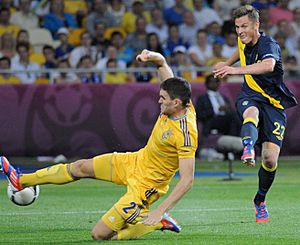
In December 2004, Rosenberg was called up to the Swedish national team for the first time. He played his first game in January 2005. Later that year, he scored two more goals for Sweden.
In May 2006, Rosenberg was chosen for the Swedish squad for the 2006 FIFA World Cup. He was a substitute and did not play in any games. Sweden was knocked out in the round of 16. In September 2006, he scored his fourth international goal.
In a Euro 2008 qualifier, Rosenberg was involved in an incident where a Danish player punched him. Sweden was given a penalty, and the match was stopped. Four days later, he scored and assisted a goal in a 5–0 win. In September 2007, he scored his sixth international goal. After Sweden qualified for UEFA Euro 2008, he was chosen for the squad. He played two games in the tournament, but Sweden was eliminated in the group stage.
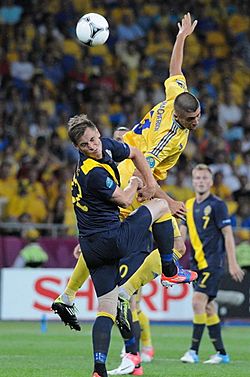
After not playing for the national team for two years, Rosenberg was called up again in March 2011. In May 2012, he was called up for the UEFA Euro 2012 squad. He played his first game for Sweden in three years before the tournament. He played two games in the tournament, but Sweden was again eliminated in the group stage. After Euro 2012, he lost his spot on the national team. In August 2014, after a successful club season, he decided to retire from international football to focus on Malmö FF. In total, he played 33 games and scored six goals for Sweden.
Personal Life
Markus Rosenberg was born in Malmö, Sweden. His father, Paul, was a salesman, and his mother was Marie. He has two younger siblings, Patrick and Linda. His family moved around Malmö a lot when he was growing up.
Rosenberg went to different schools in Malmö. He studied at a football high school, where he was a top student.
Markus is married to Maria, and they have two children together. His agent during his playing career was Martin Dahlin.
In February 2019, Rosenberg received the "Andreas Nilsson Memorial Award 2019." This award recognized his many years of dedication as a player and captain for Malmö FF.
Images for kids
-
Rosenberg during his second spell at Malmö FF in 2014
-
Rosenberg training with Ajax.
-
Rosenberg pictured during his time at Ajax.
-
Rosenberg playing for Werder Bremen against FC Bayern Munich in 2007.
-
Rosenberg celebrating a goal at Werder Bremen on May 6, 2007, which he went on to score a hat–trick to win 4–1 against Hertha BSC.
-
Rosenberg training at Werder Bremen.
-
Rosenberg before a Champions League match against Shakhtar Donetsk in 2015.
-
Rosenberg showing leadership during a Champions League qualifier against Red Bull Salzburg in 2015.
-
Rosenberg marking Paulo Miranda during a Champions League qualifier against Red Bull Salzburg in 2015.
-
Rosenberg talking to referees and the opposition's players during a Champions League qualifier against Red Bull Salzburg in 2015.
-
In his last home match at Malmö FF against Dynamo Kyiv, the club's supporters honored Rosenberg with a special display.
-
Rosenberg had his shot blocked by Yevhen Selin while playing for Sweden at UEFA Euro 2012.
-
Rosenberg and Yevhen Khacheridi after chasing a ball while playing for Sweden at UEFA Euro 2012.
See also
 In Spanish: Markus Rosenberg para niños
In Spanish: Markus Rosenberg para niños
 | John T. Biggers |
 | Thomas Blackshear |
 | Mark Bradford |
 | Beverly Buchanan |


